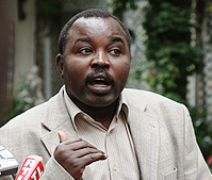Darfur rebel leader maintains his rejection to current UN-AU mediation
January 20, 2008 (PARIS) — The founder of the Sudan Liberation Movement (SLM), Abdel-Wahid Al-Nur reaffirmed his commitment to a political settlement of the five year conflict in Darfur. However, he reiterated that the position of his movement remains unchanged towards the ongoing peace efforts.

The rebel leader said he is prepared to take part in the peace process only when the “conflict suspension” is achieved on the ground and the return of villagers to their home is secured.
Al-Nur added that the current efforts conducted by the African Union and the United Nations ignore totally their demands that will ensure a lasting peace. He added that the mediation is encouraging dissidence within the movements opposed to the current process and trying to convince field commanders into attending it.
The influential leader warned that as long as the demand of civilians’ security is not fulfilled there would be no negotiations with Khartoum, asserting that the government has no credibility and they have to see what they had agreed first, the ceasefire, implemented before evolving in the new process.
HOW TO AND WITH WHOM THEY CAN NEGOTIATE
The rebel leader stressed that only the implementation of the “Conflict Suspension” can create conducive environment to hold talks with the Sudanese government. Abdel-Wahid Al-Nur said that once this condition is fulfilled, the mediators have to specify whether they want to amend the Darfur Peace Agreement (DPA) or to start a new peace process.
Following a two year peace process mediated by the African Union in Abuja, Sudanese government and one rebel group, led by Minni Minawi signed on May 5, 2006 a peace agreement, which covers security, wealth-sharing and power-sharing. The two main groups, SLM of al Nur and JEM Khalil Ibrahim refused to sign it, asking for additional concessions from Khartoum.
Al-Nur said if the mediation wants to pursue its efforts for a complementary document to the existing text of the DPA, then they have to continue with the two main movements that rejected the agreement and negotiate together with Khartoum to sort out a better agreement reflecting the aspirations for peace; security and development in Darfur.
Asked about the other rebel groups, the rebel leader said that from the start there were two principal rebel movements, suggesting that the splinter groups have to join the two main groups and participate under their umbrellas.
Regarding splinter factions that refuse to joint the main groups, Abdel-Wahid said they can wait for the post negotiations period and participate in the Darfur Dialogue process to achieve their political goals.
This position by Al-Nur is similar to the position proclaimed by the Justice and Equality Movement (JEM) which asked the mediation to limit the political process to the two parties that rejected the DPA. JEM chairman, Khalil Ibrahim, demanded that the mediation to sign a protocol with his movement on the procedural aspects, the parties that would participate and the agenda of the talks.
The current approach of the joint mediation is to involve all the rebel groups in the peace process regardless of their representation. This method, plus the involvement of some regional actors in the peace process while they support some splinter groups lead to believe that the mediators want to marginalize and punish the two main groups fro their rejection of the DPA, al Nur said.
Also the main rebel movements accused the mediation team of encouraging their fragmentation. Following the signing of Abuja peace deal, AU and the Sudanese government welcomed and encouraged the adhesion of some breakaway groups to the DPA.
International experts estimate some 200,000 have died and over 2 million have been driven from their homes during 4-1/2 years of fighting in Darfur. Sudan puts the death toll from the conflict at just 9,000.
(ST)
